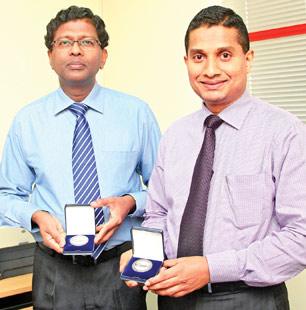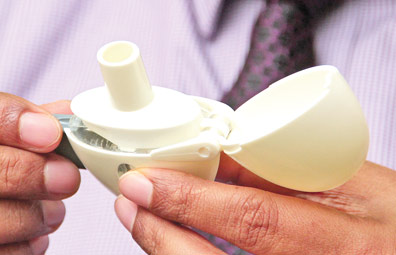|
Lankan scientists win international award:
The puff that prevents asthma
by Zahrah Imtiaz
On an average, today, one in five Sri Lankans suffer from asthma. The
patient gets spasms of attacks in the bronchi of the lungs, causing
difficulty in breathing. For some, asthmatic attacks are random and
would go away with time, but for others it can be a lifelong battle.
 |
|
Manoj Hettiarachchi and
Nalin Kannangara with the Silver Medals |
Inhalers, tablets and nebulizers plague the lives of many an
asthmatic, with no way out. However, two Sri Lankan scientists Manoj
Hettiarachchi and Nalin Kannangara have come up with a method of drug
delivery which will help asthmatics faster and for longer periods.
"It is a horrible sight to see and so very common. Some of my own
family members suffer from asthma. In a way, it has been quite a
personal endeavour for me", said Hettiarachchi, as he sat next to his
partner, Kannangara. They are the first Lankans to be awarded a 'process
patent' in medicine in Sri Lanka.
Hettiarachhi and Kannangara have worked for the pharmaceutical
company Emerchemie NB Ceylon Ltd since 2002 and 2003, respectively.
Their common interests in research brought them together to work on how
best to improve the manufacturing process for an asthma drug so that its
delivery into the lungs is optimized.
It has been a good year for the duo, their process patent for a
therapeutic in the treatment of asthma (specifically Chronic Obstruction
Pulmonary Disease (COPD)) won the Presidential Award in February; and in
April they won the Silver Medal at the Inventions Convention held in
Geneva, where they represented Sri Lanka.
"We were influenced by our mother company Emerchemie which was
already into marketing respiratory medicines in the country. And over
the years we have noticed the increase in the medications, the value of
the medicine and the number of patients affected by asthma", explained
Hettiarachchi.
In addition, as Sri Lanka faces an ageing population, the number of
older patients suffering from asthma will increase.
"The elasticity of the lung parenchyma becomes less as you age and
the person has to make a greater effort to (inspire) breathe. Thus, a
patient suffering from COPD or asthma, has to take more drugs as he
grows older. All these problems meant we need a process where the drugs
would be delivered efficiently into the lungs," said Hettiarachchi.
To overcome these problems, Hettiarachchi and Kannangara have been
working tirelessly for the last seven years to design a process which
would be both safe, effective and affordable.
"Asthmatic drugs mostly target the lungs because the disease is such
that you need a quick response," said Hettiarachhi.
"The best way to have localized and fast action is to use oral
inhalation where an inhaler device is used to inhale the drug directly
into the lungs. It has less side effects compared to the tablets",
Kannangara said.

The inhaler
|
There are two forms of oral inhalation drugs; aerosols and dry power
inhalation (DPI). The latter being cheaper the two scientists decided
that DPI would be the most cost effective drug for Sri Lankans.
Their patent involves finding the best way to deliver the active
ingredient in the asthmatic drug into every part of the lung.
The end product is a capsule carrying six micro grams of the active
ingredient in powder form. The capsule is inserted into an inhaler
device and sent directly into the lungs.
The challenge however was to carry this minute amount of drug into
the lungs without it being wasted on the way. The solution was to use a
'carrier molecule' which would take the drug right into the lung and
leave it there without interrupting its pathway, explained Kannangara.
"It is like a passenger travelling on a bus, and reaching the
destination, leaves the bus and moves on, without taking the bus with
him", he said.
The best carrier molecule for the job was inhalation grade lactose.
The lactose however, has to be mixed with the active ingredient and pre
mixed in very specific proportions to work and the ratio of carrier
molecule to active ingredient won them the patent.
"The velocity at which the drug is delivered is also important, thus
the inhaler device which the patient uses also matters. While we are
working on two inhaler devices, our lab tests have shown that almost all
devices currently in use are acceptable, though in varying degrees of
effectiveness,", said Hettiarachchi.
Commercializing the concept
Many inventions fall on the wayside when it comes to
commercialization and as all inventors, Hettiarachchi and Kannangara had
to struggle to find the level of investment they needed to set up their
factory and laboratory.
"When we tested our results in vitro, we got impressive results but
we needed a fairly large capital investment to start such precision
manufacturing", said Hettiarachchi.
In 2012 they found the capital to go big and established a company
called 'Emergence Life' to manufacture under. They started supplying to
private companies at first and soon expanded to state hospitals through
the Health Ministry.
"With our process, we have managed a lower cost of production than
the imported drugs thus enabling us to compete effectively", said
Kannangara.
"There is a common feeling that local products cannot compete with
imported items. But in our part of the world, if we are to produce the
cheapest drug with the best quality, we need to find ways to improve our
manufacturing process, not cut costs and find short cuts", Hettiarachchi
said.
Kannangara explained they followed the Good Manufacturing Practices (GMP)
guidelines prescribed by the WHO to adhere to quality and safety
standards,
"Our products have also been tested by an independent laboratory of
international repute to certify that they are safe. Our drugs act
directly on the lungs, so we have to make sure they are of the best
standards. We cannot afford to take risks in safety when dealing with
drugs", said Kannangara.
Given their company's ties to international pharmaceutical companies,
Hettiarachchi said they were always exposed to the international culture
of research. They were supported by the company to take risks and
persist with the project.
"We have been very lucky in that aspect. We didn't have the necessary
capital, so it was great that Emerchemie agreed to invest. Most
inventors and innovators fail because they have no financial backing to
turn their inventions into reality", said Hettiarachchi.
He observed that greater research in pharmaceuticals was the need of
the hour as the country lost millions in foreign exchange every year
through the import of drugs.
They also noted that the inventors commission of Sri Lanka helped
them with their application process to win the award.
Hettiarachhi, the business minded of the two said the next stage of
the project was to further consolidate their process and improve on it
to produce more.
"We want the people to get to know our equipment, the processes and
design standard operating procedures. There have been times when we have
thrown away millions worth of goods because it did not meet standards.
We are not looking for short term commercial success but long term
benefits", he said.
They plan to introduce more niche products in the respiratory field
and expand their product portfolio in the next three years.
Producing precision drugs in a tropical environment however, has not
proven to be easy. Their laboratories have been designed under strict
climate controls but increasing humidity due to climate change would
pose greater challenges for storage and production.
Both Hettiarachchi and Kannangara are science graduates from the
Universities of Colombo and Sri Jaywardenapura respectively, and have
hired local science graduates to work with them.
"We have around 15-20 science graduates now but it is hard to keep
them and find more", said Kannangara.
According to the National Academy of Sciences 80 percent of all
special degree science graduates leave for the UK and USA within the
first year of graduation.
Hence, scaling up of production would depend on the availability of
qualified people in the industry.
Advice to inventors
Being pioneers in the field of process patents, they advise young
inventors and innovators to persist and find something the people would
need.
"Never give up. Research is difficult, especially in the scientific
field. Very few products in the pharmaceutical industry reach commercial
success. When you do your research identify a niche and go against the
tide. Many asked us to do a simple filling job and get the premix made
in a foreign country, I hope we have proven them wrong", said
Hettiarachchi.
"The inventor should identify a product which will be of value to the
end user, then, the product will definitely succeed. Otherwise, there's
no market and no demand. Also, it has to be cost effective and of good
quality", said Kannangara. |

